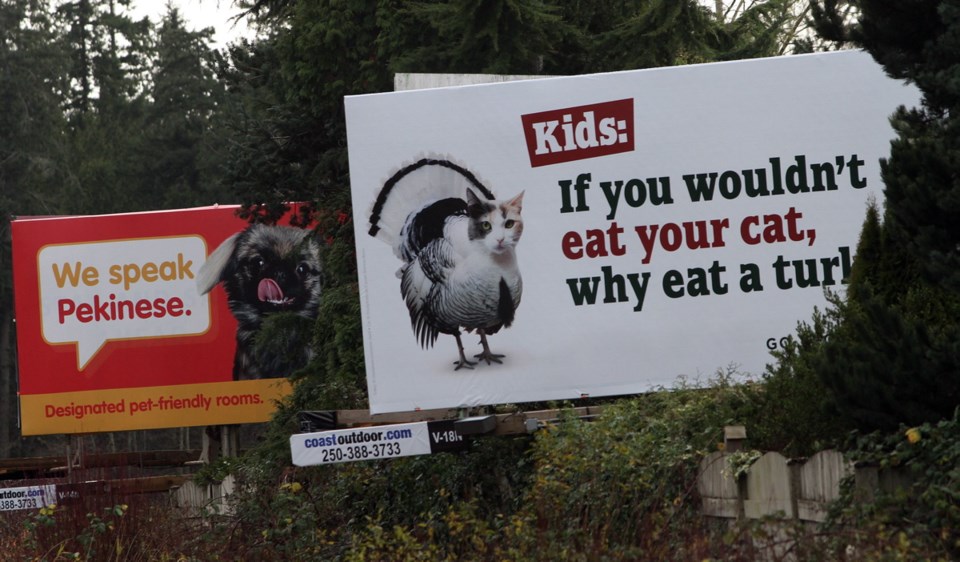People for the Ethical Treatment of Animals is an organization that has done much good and continues to do so, but trying to intimidate children into believing having a turkey dinner is the same as eating your pet cat goes too far.
PETA has erected a billboard along the Pat Bay Highway depicting a turkey with a cat’s head and the words: “Kids: If you wouldn’t eat your cat, why eat a turkey? Go vegan.”
Most adults can easily laugh it off — of course, eating a turkey is not the same as eating a cat, which is taboo in our culture — but it’s unfair and inconsiderate to lay that kind of guilt trip on children.
Kids are bombarded by fast-food ads, as Danielle Katz of PETA points out, and the billboard seeks to offset that negative influence. But it’s only in mathematics that two negatives can make a positive. Fast-food ads appeal to appetite, not to reason. The same can be said of the PETA billboard — it appeals negatively to emotions, not to reason. It’s the sort of thing that can give children nightmares.
There’s nothing wrong with emotions — they help make us human and humane — but decisions should be based on reason as well as feelings. There are plenty of good reasons to consider a vegan diet, and enticing people to investigate that lifestyle will work far better than trying to shame them into it by slagging the traditional Christmas dinner.
PETA has done impressive and important work in exposing cruelty to animals and in advocating for humane and respectful attitudes toward our fellow creatures. But the Pat Bay Highway billboard, rather than engendering sympathy for the organization’s cause, is more likely to turn people off. It’s far easier to influence friends than it is enemies, and you don’t make friends by making people mad.
Turkeys are not cats. Domestic turkeys are destined to be eaten — they would not exist otherwise — but until they are butchered, they should be treated humanely. And B.C.’s turkey farmers have developed codes of practice aimed at ensuring proper conditions for the birds as they are raised. Groups like PETA have had a hand in developing such codes.
One person who believes in the humane treatment of livestock is Temple Grandin, the U.S. animal scientist who drew on her own experience with autism to develop kinder and less stressful methods of handling animals as they are being led to slaughter.
“I think using animals for food is an ethical thing to do, but we’ve got to do it right,” Grandin wrote. “We’ve got to give those animals a decent life, and we’ve got to give them a painless death. We owe the animal respect.”
That’s a philosophy that combines compassion and reason, idealism and reality. It’s more likely to promote thoughtful consideration of the issue than will the shock value of PETA’s billboard.
And PETA should know — in 2004, it honoured Grandin with an award for being a visionary in the field of animal welfare.
Besides, the billboard doesn’t tell the full story. The pet cat pictured is a carnivore — creatures must die for it to eat. While some vegetarian cat foods are available, most veterinarians, humane societies and animal scientists agree a cat needs to eat meat to be healthy.
And given the choice, that cat will eat its own version of a turkey — a rodent or a songbird — after it has stalked it and played with it for a while.



